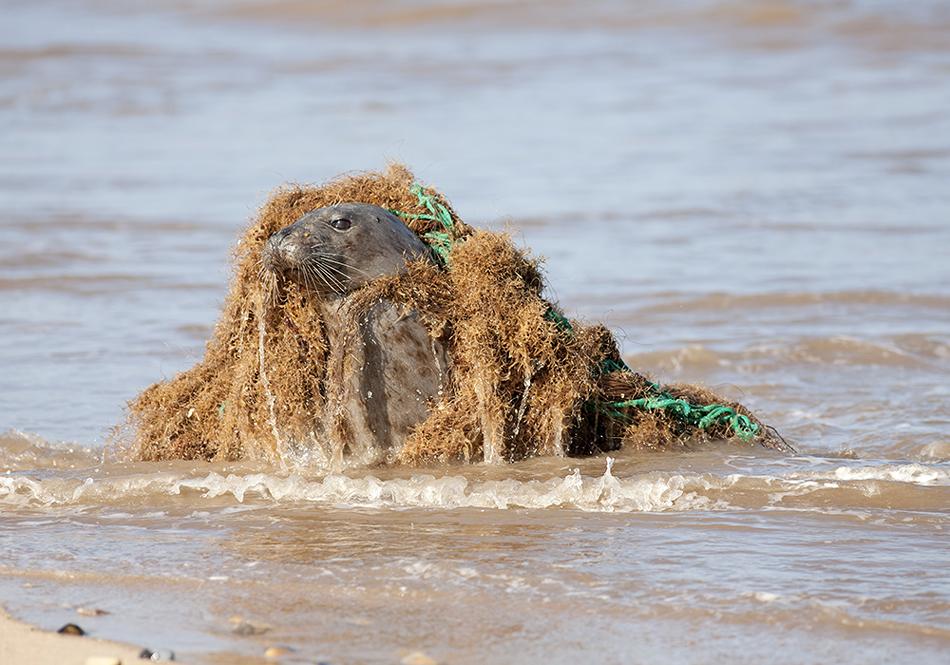
Kerry Mackay sets out the problem of microplastics, how they get into the sea, and what we can all do to trap them at source.
We’re all familiar with doing the laundry. The sweaty thermal base layers, the salty undersuits from when our ‘dry’ suits have flooded. As divers, we do quite a lot of laundry. Did you know that every wash you are spewing thousands of tiny pollutants into the sea?
Many of our clothes are made using plastics like polyester, nylon, acrylic and polyamide. My undersuit is mostly polyester, but you’ll find these materials in most of your non-diving clothes too. During each wash, tiny fibres break off with movement and friction. These tiny bits (microfibres) are a type of microplastic.
Microplastics are simply tiny pieces of plastic. Specifically, pieces less than 5mm long. Just one fleece jacket releases roughly 250,000 microfibres every time you wash it!Clothes washing in the UK is estimated to be responsible for around 1,600 tonnes of plastic pollution pouring into our waterways every year. That’s the same weight as 12 blue whales!
During each wash, tiny fibres break off with movement and friction. These tiny bits (microfibres) are a type of microplastic
These microfibres are being found everywhere, in the rivers and seas, the air we breathe, our food and drink, and even inside the human body. We are yet to fully understand the consequences of this but given the high quantities and toxic nature of many of the plastics involved, it’s almost certainly not good for us or the amazing creatures we visit in the sea!
In fact, studies are showing that toxic chemicals already in the oceans stick to microplastics. Then they get eaten by a fish, which is eaten by a bigger fish, then a seal… and so on up the food chain until an apex predator like an orca eats it. The West Coast pod of orca in the UK, have not managed to breed in around 30 years. Evidence suggests this is due to high levels of PCB chemicals in their bodies. I can tell you that story in a future article.
So what can you do? Here are some easy things to do that will help reduce the microfibres you add to our beautiful oceans:
- Choose clothing made from natural materials rather than synthetic fabric. For example, cosy merino wool instead of polyester thermals.
- Keep your clothes as long as possible, mend them, buy second hand and do clothes swaps. Clothes shed the most microplastics when they are new.
- Run your washing machine with a full load, on a low temperature, and slow spin. Eco-wash settings are great, paradoxically the delicate setting is actually worse for creating microplastics. So avoid that setting!
- Wash your synthetic fabrics inside a microplastic collecting laundry bag or with something like the Cora Ball. The most commonly known brand of bag is the Guppyfriend Wash Bag (or Guppy Bag), of course there are many other brands available too. [If you can’t afford, or simply don’t want to buy yet another thing, you can wash your synthetic fabrics inside a zip-up pillowcase]
- Avoid tumble drying and instead air dry your laundry. This reduces microfibres, saves energy, and your bills too.
- Fit a microplastic filter to your washing machine. Just do a search for ‘microplastic filter’ and you’ll find plenty of options, Guppyfriend do one too.
- Add your voice to campaigns for laws to have microplastic filters fitted as standard in new washing machines and water treatment works:
- Email your MP
- Get in touch with the All-Party Parliamentary Group on Microplastics
The Microplastic Filters (Washing Machines) Bill is currently working its way through the cogs of government. This is a slow process that needs your support to push it through. You can follow the Bill’s progress here.
So far, only France has made washing machine filters mandatory from 2025. We have the evidence and means to stop these microfibres from reaching our seas. So I hope you will take at least one action to help stop this needless flood of plastic into our beloved waters.
Article ‘Dirty laundry’ by Kerry Mackay first published in SCUBA magazine, Issue 141 Jan/Feb 2024.

 Author: Kerry MacKay | Posted 31 Jan 2024
Author: Kerry MacKay | Posted 31 Jan 2024



